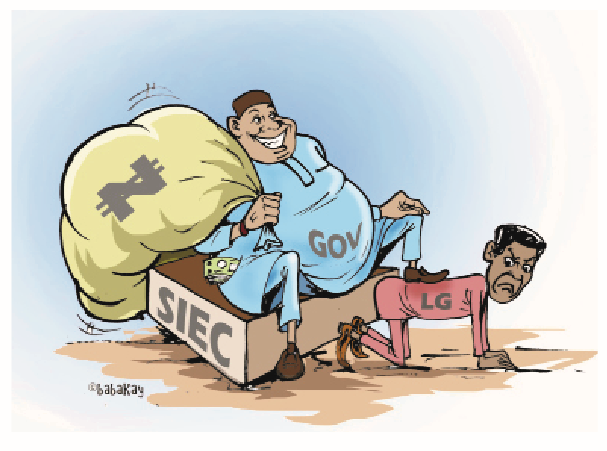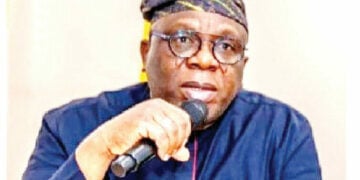Elections conducted by State Independent Electoral Commissions (SIECs) are nothing short of a charade – a blatant mockery of the democratic principles that should define a genuine electoral process. These elections exhibit a predictable pattern, with outcomes that are far from surprising. The ruling party in the respective states consistently emerges victorious.
The creation of SIECs is sanctioned by Section 197(1) of the 1999 Constitution (as amended), ostensibly because the framers of our nation’s foundational document believed they would serve a crucial role.
SIECs are entrusted with the responsibility of conducting elections that are free, fair, and credible, ultimately establishing a framework for sustainable electoral processes. They are also mandated to educate voters in preparation for local government elections, which aim to determine the composition of councils led by a chairman and comprising elected councilors. This implies that SIECs should actively foster a robust democratic process.
At its core, as an election management body, the key role of SIEC is to oversee credible elections for chairmanship and councillor positions.
Shabby elections
Regrettably, SIECs have consistently fallen short in fulfilling this mandate. Elections organised by these commissions routinely fail the credibility test, often displaying blatant disregard for the very rules they are supposed to uphold, all in a desperate attempt to favour the ruling party.
This explains why it’s commonplace for the ruling party to claim all available seats, even in states where the opposition holds a significant presence and demonstrates strength.
Recently, Edo State held a local government election, which, predictably, followed the familiar but disheartening pattern of the ruling party sweeping all chairmanship and councilor seats.
Consider this: In Edo State, during the previous general elections conducted by the Independent National Electoral Commission (INEC), both the Labour Party and the ruling All Progressives Congress (APC) put up impressive performances. They secured victories in various senatorial, House of Representatives, and State Assembly seats. However, in the local government elections, the PDP secured all 18 chairmanship seats and all councillor seats.
The question blowing like wind on the minds of many is: where did the votes for the LP and APC go?
The APC, for example, won the Edo Central senatorial seat, with Monday Okpebholo emerging as the victor, while the Edo North senatorial seat went to Adams Oshiomhole, also of the APC. Meanwhile, Labour Party’s Neda Imasuen clinched the Edo South senatorial seat in the last general election.
Yet, Edo SIEC expects Nigerians to believe that despite their remarkable performance in the general election, these two parties couldn’t muster enough votes to secure even one out of the 18 chairmanship seats or one of over a hundred councillors’ seats.
Well, Nigerians know too well that the answer is forthright: in Edo, as in many states where the ruling party consistently triumphs in SIEC-run elections, the playing field is anything but level.
SIECs are often staffed by individuals who are either card-carrying members of or sympathetic to the ruling party. Governors ensure that only loyalists and party sympathisers are appointed to serve on these commissions.
This phenomenon is not unique to Edo; it is prevalent in almost all states across the country during local government elections where vast amounts of the state’s limited resources are expended.
In 2020 and 2021, during the local government elections in states like Bauchi, Gombe, Kogi, Kano, Kebbi, Nasarawa and Osun, ruling parties secured overwhelming victories. With only a handful of exceptions, the governor’s party consistently dominates local government elections through a flawed and premeditated process.
There is clearly no reason why the states should continue spending resources on what can best be described as a predetermined outcome. This is a wasteful exercise that cannot, by any measure, be termed an election.
Unchain LGs
However, this charade is perpetuated by governors’ stubborn desire to maintain tight control over local governments, effectively reducing this tier of government to a mere extension of the state government.
Often, those who emerge as the ruling party’s candidates and eventual winners in these sham polls are handpicked by the governor or individuals acting on his behalf.
This desperation among governors to ensure that only their party’s candidates triumph in council elections is an extension of their determination to chain local governments and ensure they remain perpetually subservient to state control and maintain a tight grip on local government finances.
Governors have effectively assumed the role of emperors, using local government funds pooled into joint accounts as if they were their personal funds. Starved of resources, local governments, despite being the closest tier of government to the people, have remained utterly dormant and ineffective.
Clearly, Nigeria cannot continue on this path, but drastic measures are needed to rectify this situation.
The Way Forward
To address this vexing issue, we must amend the constitution to guarantee financial autonomy for local governments and abolish SIECs. Instead, entrusting the responsibility of conducting local government elections to INEC would be a step in the right direction. This would ensure that funds allocated to each local government are delivered without interference from any quarter, and the process of selecting leadership at the local government level is transparent and free from manipulation.
With such reforms in place, the nation can finally experience genuine grassroots development.





